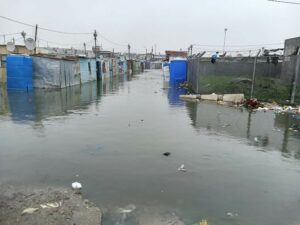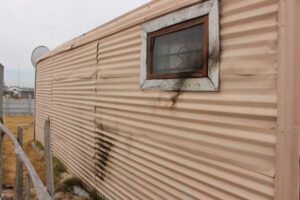
Residents of Chicken Farm near Mdantsane are frustrated with the lack of basic services in the settlement and feel abandoned by the municipality. Without water, sanitation and electricity, these residents have lost hope.
Mbulelo Nxomani says that without toilets, residents have to relieve themselves in the bushes behind their houses. “Some of our RDP houses are incomplete, they don’t have taps or running water. There are no toilet seats; people use the forest behind them to relieve themselves. This is an injury to dignity,” he says.
Nxomani says he joined in the occupation of the RDP houses four years back because they were being vandalised.
When Elitsha visited the area, most of the houses had no running water, windows and doors. A pipe lay beside the street where residents kneel to get water. Some used wheelbarrows to fetch water.
The 2024 General Household Survey by Stats SA found that about 8,000 households in the Buffalo City Metro have no proper sanitation and still rely on the bucket system.
Another resident complained that the ward councilor was not visible in the area and community meetings to address the issues of service delivery have never been held. “We are left in the desert here; we have never seen even the ward councilor here. The only meetings we had were organised by few others to address crime. We have illegally connected electricity, and we rely on that pipe lying by the street for clean water,” she says.
The 55-year-old mother, who lives with two grandchildren and her unemployed daughter, said they were looking forward to next year’s local government elections. “Our children are unemployed; they do not even have piece jobs from municipal programmes because we are the outcast. The ward councilor clearly does not want to be associated with this area; he does not represent us. We will meet them next year in the elections,” she says.
Councillor Oscar Mhlauli confirmed that the area is in his ward. “It is not that I do not want to be associated with them but according to the plan, that area is a site; the project has not been handed over and the matter is with the court. Obviously, we can’t deliver services to them,” said Mhlauli.

Rightful owners of RDP houses suffer the same
In Fynbos 1, East Bank, residents also bear the brunt of living without basic sanitation. Over 200 households rely on 8 communal toilets while 12 others are not functioning.
The residents live in makeshift bungalows after their rightful RDP homes in the failed Fynbos housing project were illegally occupied more than ten years ago. They describe the living conditions as inhuman. “The 8 functioning toilets here, some do not even have doors. People prefer to use buckets because the toilets are a distance from the houses. We live in an unsanitary situation where some even spill those buckets in front of other people’s doors,” laments Nombulelo Gqisha.
She says the condition of the toilets and overcrowding has led to heightened risks of disease transmission. There is also no routine waste collection and people dump garbage everywhere. The bungalows they stay in are temporary structures and are dilapidated, with leaking roofs and cracked walls. “There is poor ventilation which has created mold and because of that we have respiratory problems and arthritis.”
Ward 8 councillor, Kwanele Majeke said his office, the municipality and provincial government were aware of the situation. He blamed the residents for the poor condition of the toilets. “The issue is the overcrowding because some people are not meant to be residing there. That has led to the poor condition of the structures and also the toilets. We placed caretakers to clean those toilets, but the residents made it unbearable for them to continue to work,” said Majeke.
He visited the area with officials from the provincial human settlements department to inform residents about plans to construct new toilets. “Because we frequently must replace those toilets, we have resolved to construct new ones because the matter of their illegally occupied houses is with the court,” he said.




